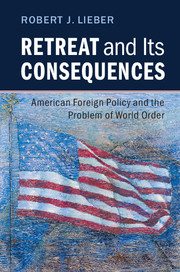Book contents
- Frontmatter
- Dedication
- Contents
- List of figures and tables
- Acknowledgments
- Introduction
- 1 Foreign policy retreat and the problem of world order
- 2 Burden sharing with Europe: problems of capability and will
- 3 Middle East policy: regional conflicts and threats to national interest
- 4 BRICS: stakeholders or free-riders?
- 5 Retreat and its consequences
- 6 Can America still lead – and should it?
- Index
3 - Middle East policy: regional conflicts and threats to national interest
Published online by Cambridge University Press: 05 May 2016
- Frontmatter
- Dedication
- Contents
- List of figures and tables
- Acknowledgments
- Introduction
- 1 Foreign policy retreat and the problem of world order
- 2 Burden sharing with Europe: problems of capability and will
- 3 Middle East policy: regional conflicts and threats to national interest
- 4 BRICS: stakeholders or free-riders?
- 5 Retreat and its consequences
- 6 Can America still lead – and should it?
- Index
Summary
We have been very clear to the Assad regime, but also to other players on the ground, that a red line for us is we start seeing a whole bunch of chemical weapons moving around or being utilized. That would change my calculus. That would change my equation.
– President Barack ObamaSince the end of the Cold War a quarter-century ago, efforts to delineate US grand strategy have been a hardy perennial of writing and debate among foreign policy elites and scholars. The post–Cold War decade, the 9/11 terrorist attacks on New York and Washington, wars in Afghanistan and Iraq, the impact of the financial crisis and great recession, the rise of China, Putin's Russia, and widening upheaval and conflict in the Middle East have given impetus to such efforts. Yet, with the exception of the containment doctrine during the Cold War, achieving a comprehensive grand strategy is probably an unrealistic and unattainable goal. In the absence of a single, unambiguous and overriding threat, the American policy process remains too vast and complex, the chess board of world politics too elaborate, the issue areas too numerous, and the disparity between overall principles and real-world events too great.
For the Obama administration, the president's attempts at setting out a foreign policy concept were initially evident in his Cairo speech and Nobel Peace Prize acceptance address, and subsequently in presidential rhetoric and official statements of national security strategy, though by themselves these served more to describe attitudes, visions, and impulses rather than to create a comprehensive strategy.
In practice, however, a transformed approach to foreign policy has emerged, and nowhere more so than in US Middle East policies on a wide range of fronts. These have included Iran and its nuclear program, the Syrian conflict, the quest for an Israeli–Palestinian peace, the Arab awakening, disengagement from Iraq and Afghanistan, and responses to the threats posed by al-Qaeda and the Islamic State. Rhetoric and policy have often been at odds in these cases, and actions have at times been inconsistent.
- Type
- Chapter
- Information
- Retreat and its ConsequencesAmerican Foreign Policy and the Problem of World Order, pp. 46 - 70Publisher: Cambridge University PressPrint publication year: 2016

